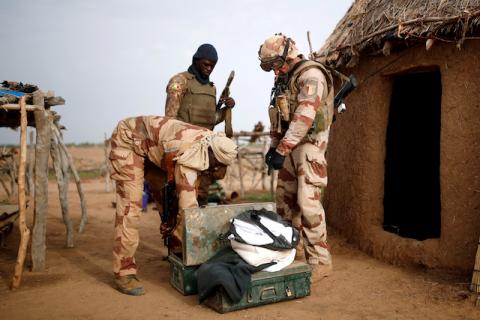Advertisement
Mali troops return to key northern city after six-year absence
BAMAKO (Reuters) - More than 200 Malian troops reached the northern city of Kidal on Thursday, the army said, in the military's first permanent deployment there since being chased out by Tuareg separatist rebels in 2014.
Photos shared by the U.N.'s peacekeeping mission showed state governor Sidi Mohamed Ag Ichrach welcoming the army convoy to Kidal, the epicentre of repeated rebellions by semi-nomadic Tuaregs seeking an independent state called Azawad.
It marks a symbolic victory for the government's efforts to restore state authority in northern Mali and implement a 2015 peace deal with the rebels that promised greater local autonomy in exchange for the return of state forces.
"I confirm the army has arrived in Kidal. They got there without any problem," army spokesman Diarran Kone said.
A detachment of 240 soldiers - one-third each drawn from existing army ranks, former separatist rebels and pro-government militiamen - set out by road from the northern city of Gao on Monday.
In a sign of the precarious security situation, peacekeepers and helicopters from the U.N. mission in Mali had been deployed to accompany the convoy, while the foreign minister tweeted on Monday that "all of Mali is holding its breath".
The most recent Tuareg insurrection, in 2012, led to the takeover of Mali's entire desert north by the rebels and loosely aligned Islamist militants, before French forces intervened the following year to beat back the jihadists.
But large swathes of the desert north have remained beyond the government's full control. Malian forces were forced to flee Kidal in 2014 after gun battles broke out during a visit by the prime minister, killing 50 soldiers.
Squabbling among the parties has slowed implementation of the 2015 deal. The political upheaval has complicated Western-backed efforts to combat jihadists linked to al Qaeda and Islamic State, who have stepped up their attacks in Mali and neighbouring countries.
In all, 428 soldiers will be deployed across the Kidal region in the coming days, officials say, and the army presence should be progressively extended to other parts of the north, where the state's authority is weak.
"We have worked a lot to arrive at this result," said Almou Ag Mohamed, the spokesman for the CMA separatist coalition. "We are talking a lot about Kidal today but the deployment of this army has to be done in Timbuktu, Gao and ... Menaka."
Ibrahim Maiga, a researcher at the Institute for Security Studies (ISS) think-tank, said the army's return to Kidal was highly symbolic but its true import remained to be seen.
"I think that this is above all a test of the good faith of the actors," said Maiga. "I see it much more as a test than a turning point or decisive step."
(Reporting by Paul Lorgerie, Additional reporting by Tiemoko Diallo; Writing by Aaron Ross; Editing by Alessandra Prentice and William Maclean)



















Add new comment